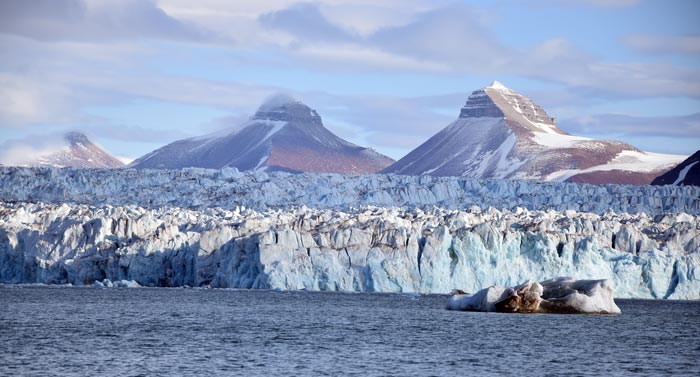Arctic Ocean started getting warmer decades earlier than we thought

An international group of researchers reconstructed the recent history of ocean warming at the gateway to the Arctic Ocean in a region called the Fram Strait, between Greenland and Svalbard, and found that the Arctic Ocean has been warming for much longer than earlier records have suggested.
Credit: Sara Giansiracusa
The Arctic Ocean has been getting warmer since the beginning of the 20th century – decades earlier than records suggest – due to warmer water flowing into the delicate polar ecosystem from the Atlantic Ocean.
An international group of researchers reconstructed the recent history of ocean warming at the gateway to the Arctic Ocean in a region called the Fram Strait, between Greenland and Svalbard.
Using the chemical signatures found in marine microorganisms, the researchers found that the Arctic Ocean began warming rapidly at the beginning of the last century as warmer and saltier waters flowed in from the Atlantic – a phenomenon called Atlantification – and that this change likely preceeded the warming documented by modern instrumental measurements. Since 1900, the ocean temperature has risen by approximately 2 degrees Celsius, while sea ice has retreated and salinity has increased.
The results, reported in the journal Science Advances, provide the first historical perspective on Atlantification of the Arctic Ocean and reveal a connection with the North Atlantic that is much stronger than previously thought. The connection is capable of shaping Arctic climate variability, which could have important implications for sea-ice retreat and global sea level rise as the polar ice sheets continue to melt.
All of the world’s oceans are warming due to climate change, but the Arctic Ocean, the smallest and shallowest of the world’s oceans, is warming fastest of all.
“The rate of warming in the Arctic is more than double the global average, due to feedback mechanisms,” said co-lead author Dr Francesco Muschitiello from Cambridge’s Department of Geography. “Based on satellite measurements, we know that the Arctic Ocean has been steadily warming, in particular over the past 20 years, but we wanted to place the recent warming into a longer context.”
Atlantification is one of the causes of warming in the Arctic, however instrumental records capable of monitoring this process, such as satellites, only go back about 40 years.
As the Arctic Ocean gets warmer, it causes the ice in the polar region to melt, which in turn affects global sea levels. As the ice melts, it exposes more of the ocean’s surface to the sun, releasing heat and raising air temperatures. As the Arctic continues to warm, it will melt the permafrost, which stores huge amounts of methane, a far more damaging greenhouse gas than carbon dioxide.
The researchers used geochemical and ecological data from ocean sediments to reconstruct the change in water column properties over the past 800 years. They precisely dated sediments using a combination of methods and looked for diagnostic signs of Atlantification, like change in temperature and salinity.
“When we looked at the whole 800-year timescale, our temperature and salinity records look pretty constant,” said co-lead author Dr Tesi Tommaso from the Institute of Polar Sciences of the National Research Council in Bologna. “But all of a sudden at the start of the 20th century, you get this marked change in temperature and salinity – it really sticks out.”
“The reason for this rapid Atlantification of at the gate of the Arctic Ocean is intriguing,” said Muschitiello. “We compared our results with the ocean circulation at lower latitudes and found there is a strong correlation with the slowdown of dense water formation in the Labrador Sea. In a future warming scenario, the deep circulation in this subpolar region is expected to further decrease because of the thawing of the Greenland ice sheet. Our results imply that we might expect further Arctic Atlantification in the future because of climate change.”
The researchers say that their results also expose a possible flaw in climate models, because they do not reproduce this early Atlantification at the beginning of the last century.
“Climate simulations generally do not reproduce this kind of warming in the Arctic Ocean, meaning there’s an incomplete understanding of the mechanisms driving Atlantification,” said Tommaso. “We rely on these simulations to project future climate change, but the lack of any signs of an early warming in the Arctic Ocean is a missing piece of the puzzle.”
Francesco Muschitiello is a Fellow of Sidney Sussex College, Cambridge.
Journal: Science Advances
DOI: 10.1126/sciadv.abj2946
Method of Research: Observational study
Subject of Research: Not applicable
Article Title: Rapid Atlantification along the Fram Strait at the beginning of the 20th century
Article Publication Date: 24-Nov-2021
Media Contact
Sarah Collins
University of Cambridge
sarah.collins@admin.cam.ac.uk
Office: 01223765542
Cell: 7525337458
All latest news from the category: Ecology, The Environment and Conservation
This complex theme deals primarily with interactions between organisms and the environmental factors that impact them, but to a greater extent between individual inanimate environmental factors.
innovations-report offers informative reports and articles on topics such as climate protection, landscape conservation, ecological systems, wildlife and nature parks and ecosystem efficiency and balance.
Newest articles

Innovative 3D printed scaffolds offer new hope for bone healing
Researchers at the Institute for Bioengineering of Catalonia have developed novel 3D printed PLA-CaP scaffolds that promote blood vessel formation, ensuring better healing and regeneration of bone tissue. Bone is…

The surprising role of gut infection in Alzheimer’s disease
ASU- and Banner Alzheimer’s Institute-led study implicates link between a common virus and the disease, which travels from the gut to the brain and may be a target for antiviral…

Molecular gardening: New enzymes discovered for protein modification pruning
How deubiquitinases USP53 and USP54 cleave long polyubiquitin chains and how the former is linked to liver disease in children. Deubiquitinases (DUBs) are enzymes used by cells to trim protein…



